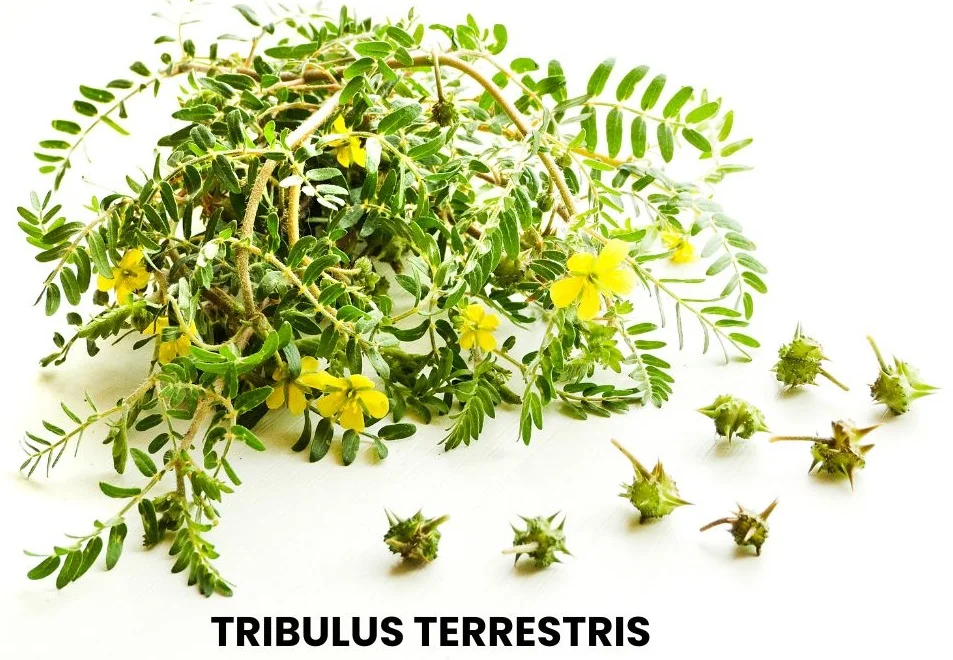Tribulus Terrestris, commonly known as Ikshugandha, is an East Indian herb known for its use in treating urinary disorders, sexual debility, and other related conditions.
It has a long history in traditional medicine, especially in Ayurveda, where it is used to strengthen the male reproductive system, improve urinary function, and address conditions like prostatitis and seminal weakness.

SOURCE INFORMATION
Scientific Classification
- Kingdom: Plantae
- Order: Zygophyllales
- Family: Zygophyllaceae
- Genus: Tribulus
- Species: Tribulus terrestris
Origin and Historical Use
- Tribulus Terrestris has been used for centuries in Ayurvedic and traditional Chinese medicine.
- In these ancient healing systems, it was revered for its ability to address male reproductive health, urinary conditions, and improve vitality and strength.
- It is commonly found in tropical regions of the world, especially in India, where it grows as a weed.
DRUG PATHOGENESIS
- This remedy primarily targets the urogenital system and is particularly effective for conditions involving the urinary tract, reproductive organs, and sexual vitality.
- It has shown efficacy in treating dysuria (painful urination), seminal weakness, prostatitis (inflammation of the prostate), and spermatorrhoea (involuntary ejaculation).
PHYSICAL CONSTITUTION, DIATHESIS, AND TEMPERAMENTS
- Physical Constitution: Suitable for individuals with weakened reproductive and urinary systems, experiencing sexual debility or urinary discomfort.
- Diathesis: Targets individuals prone to urogenital ailments and conditions related to sexual neurasthenia (nerve-related sexual weakness).
- Temperament: Often suited for those feeling fatigued, weak, or mentally exhausted due to sexual overindulgence or advancing age.
WHAT IS CONSTITUTION IN HOMOEOPATHY?
WHAT IS DIATHESIS IN HOMOEOPATHY?
WHAT ARE TEMPERAMENTS IN HOMOEOPATHY?
KEY CHARACTERISTICS
- Helpful in cases of seminal weakness and frequent, involuntary emissions.
- Beneficial for individuals suffering from prostatitis or other inflammatory conditions of the prostate.
- Effective in treating painful urination (dysuria) and other calculous (stone-related) afflictions.
- Helps in alleviating partial impotence, particularly when related to urinary problems or aging.
DETAILED ORGAN SYMPTOMS
URINARY SYSTEM
- Dysuria: Painful urination is one of the primary symptoms addressed by Tribulus Terrestris. The herb soothes irritation and inflammation in the urinary tract, promoting easier urination.
- Incontinence: It helps control involuntary leakage of urine, particularly in older individuals or those with weak bladder control.
- Painful Micturition: Alleviates pain associated with urination, often caused by urinary tract infections or inflammation of the urinary tract.
REPRODUCTIVE SYSTEM
- Seminal Weakness: This includes conditions like spermatorrhoea (involuntary emission of semen), premature ejaculation, and weakened semen.
- It helps improve the quality and strength of semen in men.
- Prostatitis: Tribulus Terrestris is highly effective for prostatitis, which involves the swelling and inflammation of the prostate gland. It reduces discomfort and aids in normal prostate function.
- Sexual Neurasthenia: A nerve-related sexual disorder often resulting in early ejaculation or reduced sexual desire.
- Tribulus strengthens the nerves, improving sexual stamina and overall performance.
GENERAL SYMPTOMS
- Partial Impotence: It is useful for those suffering from sexual weakness or impotence, particularly due to overindulgence or aging.
- Auto-traumatism from Masturbation: Helps to correct damage or weakness caused by excessive masturbation, reducing emissions and spermatorrhoea.
MODALITIES
- Worse: Symptoms worsen with sexual overindulgence or during periods of fatigue.
- Better: Symptoms improve with rest and regular use of the remedy.
WHAT ARE MODALITIES IN HOMOEOPATHY?
RELATIONSHIP WITH OTHER DRUGS
Compare with
- Agnus Castus (for sexual debility and impotence).
- Sabal Serrulata (for prostate and urinary conditions).
- Lycopodium (for urinary and sexual dysfunction in aging men).
- Damiana (for sexual weakness and nervous debility).
DOSE
- The recommended dose is 10-20 drops of tincture, taken three times daily.
- The tincture can be diluted in a small amount of water and taken before meals for best results.
Frequently Asked Questions
What is Tribulus Terrestris used for in homeopathy?
- It is primarily used to treat urinary issues such as painful urination and incontinence, as well as reproductive problems like seminal weakness, prostatitis, and partial impotence.
How does Tribulus Terrestris improve sexual function?
- Tribulus strengthens the reproductive system, improving seminal quality, reducing early emissions, and aiding in cases of impotence, particularly when related to aging or urinary issues.
Can Tribulus Terrestris help with prostatitis?
- Yes, it is highly effective in reducing inflammation and discomfort associated with prostatitis, helping to restore normal prostate function.
What is the recommended dosage for Tribulus Terrestris?
- The recommended dosage is 10-20 drops of tincture, taken three times daily.
Is Tribulus Terrestris safe for long-term use?
- When used as directed in homeopathic doses, Tribulus Terrestris is considered safe for long-term use.
- However, it is always recommended to consult a healthcare professional before beginning any new treatment.
Glossary of Difficult Words
- Dysuria: Painful urination.
- Seminal Weakness: Weakness in the reproductive system that results in issues such as premature ejaculation or poor-quality semen.
- Prostatitis: Inflammation of the prostate gland.
- Spermatorrhoea: Involuntary discharge of semen without orgasm.
- Neurasthenia: A condition characterized by nervous weakness, often manifesting as fatigue or lack of sexual stamina.
- Calculous Affections: Conditions caused by the formation of stones (calculi) in organs like the bladder or kidneys.
